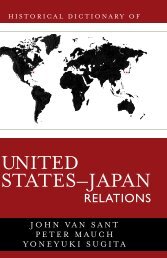Confucian Political Theory in the Face of the Future1 Mon-Han Tsai
Confucian Political Theory in the Face of the Future1 Mon-Han Tsai
Confucian Political Theory in the Face of the Future1 Mon-Han Tsai
Create successful ePaper yourself
Turn your PDF publications into a flip-book with our unique Google optimized e-Paper software.
which <strong>in</strong> turn is not really compatible with <strong>Confucian</strong> view <strong>of</strong> family, hence render<strong>in</strong>g<br />
<strong>Confucian</strong> family ethics anachronistic and undesirable (ibid, 39-43 and p164) 8 .<br />
Despite <strong>the</strong> differences <strong>in</strong> <strong>the</strong>ir temperance, approaches, tra<strong>in</strong><strong>in</strong>gs and <strong>Confucian</strong><br />
orientations, both Mou and Yu view <strong>Confucian</strong> political <strong>the</strong>ory as noth<strong>in</strong>g but obnoxious,<br />
totalitarian and anachronistic. For <strong>the</strong>m, what needs to be cherished and developed<br />
fur<strong>the</strong>r is <strong>Confucian</strong> <strong>the</strong>ory <strong>of</strong> moral cultivation. The only great difference with regard<br />
to <strong>the</strong> relations between politics and <strong>Confucian</strong>ism is Mou felt obliged to justify<br />
<strong>Confucian</strong> moral philosophy on <strong>the</strong> ground that it could have lead to science and<br />
democracy, and <strong>the</strong> younger Yu have no such compulsion and wants a clean break by<br />
sever<strong>in</strong>g politics from <strong>Confucian</strong>ism altoge<strong>the</strong>r.<br />
The Return <strong>of</strong> <strong>Confucian</strong>ism<br />
The return <strong>of</strong> <strong>Confucian</strong>ism to Ch<strong>in</strong>a began not <strong>in</strong> Ch<strong>in</strong>a, Japan, Korea or Taiwan,<br />
but <strong>in</strong> North America 9 . In recent years, <strong>Confucian</strong>ism has become a fad <strong>in</strong> Ch<strong>in</strong>a from<br />
government, bus<strong>in</strong>ess, and university to ord<strong>in</strong>ary people. Official patronage <strong>of</strong><br />
<strong>Confucian</strong>ism becomes more frequent and high-level. Official references to <strong>Confucian</strong><br />
ideas and passages have also become <strong>in</strong>creas<strong>in</strong>gly standard. Hu’s talk <strong>of</strong> creat<strong>in</strong>g a<br />
harmonious society is a most prom<strong>in</strong>ent case <strong>in</strong> demonstrat<strong>in</strong>g how dramatically <strong>the</strong><br />
fortune <strong>of</strong> <strong>Confucian</strong>ism has reversed <strong>in</strong> <strong>the</strong> last twenty years or so. When <strong>the</strong> Ch<strong>in</strong>ese<br />
government launches overseas Ch<strong>in</strong>ese language education programs around <strong>the</strong> world,<br />
<strong>the</strong> name chosen for <strong>the</strong> program or school is Confucius Institute. CCTV’s program on<br />
Confucius’s Analects by Yu Dan was one <strong>of</strong> <strong>the</strong> most popular programs last year, and <strong>the</strong><br />
book based on it has s<strong>in</strong>ce been a bestseller <strong>in</strong> Ch<strong>in</strong>a. Even <strong>in</strong> a former cadets-tra<strong>in</strong><strong>in</strong>g<br />
university, Renm<strong>in</strong> (People’s) University, a Confucius research centre has been also set<br />
8 Yu (2004) <strong>in</strong> his meticulous study <strong>of</strong> Zhu Xi situates Zhu Xi <strong>in</strong> <strong>the</strong> political culture and context <strong>of</strong> <strong>the</strong><br />
Song dynasty and argues without this contextualisation, one would not understand Zhu appropriately.<br />
In vol 2 appendix, he was very concerned with <strong>the</strong> New <strong>Confucian</strong> scholar, Liu Shu-hisen’s charge that<br />
he prioritises politics (wai wang) over moral cultivation (neisheng) <strong>in</strong> his <strong>in</strong>terpretation <strong>of</strong> Zhu Xi and<br />
Neo-<strong>Confucian</strong>ism. In his responses (ibid, 867-928) while <strong>in</strong>sist<strong>in</strong>g on <strong>the</strong> accuracy <strong>of</strong> his<br />
<strong>in</strong>terpretation (that to understand Song Neo-<strong>Confucian</strong>ism, it must be situated <strong>in</strong> political contexts<br />
and to recognise politics was higher than moral cultivation for Neo-<strong>Confucian</strong>ism ultimately), he<br />
never<strong>the</strong>less reiterates that as for him, he has long given <strong>the</strong> political pretension <strong>of</strong> <strong>Confucian</strong>ism and<br />
believes that <strong>Confucian</strong>ism should focus only on <strong>the</strong> cultivation <strong>of</strong> <strong>the</strong> self.<br />
9 Masataka Yasutake <strong>of</strong> Kansai University upon hear<strong>in</strong>g this suggested to me that it is perhaps<br />
similar to Renaissance <strong>in</strong> Europe began from <strong>the</strong> recovery <strong>of</strong> Plato, Aristotle and o<strong>the</strong>rs <strong>in</strong> Arabic<br />
before transmitted to Italy.<br />
11













